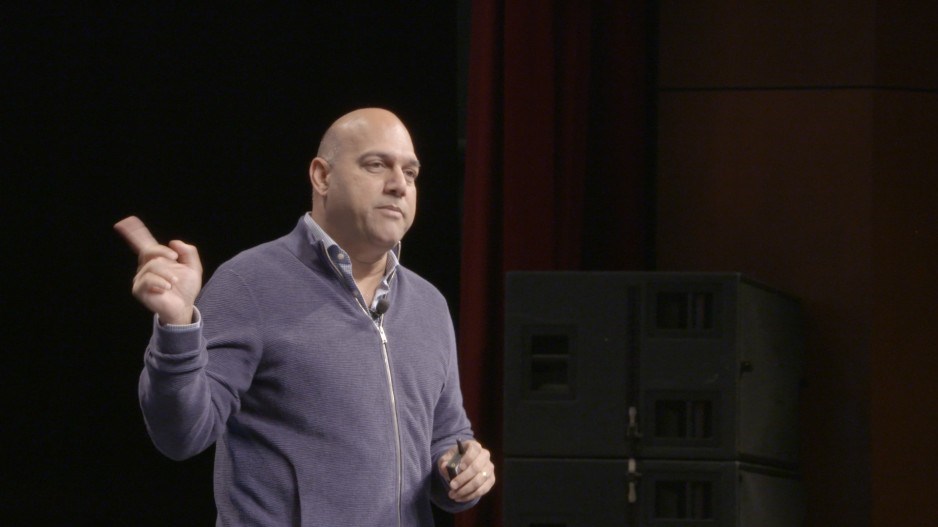Canadian serial entrepreneur Salim Ismail is the former chief innovation officer at Yahoo, the co-author of Exponential Organizations and the founding executive director of the Singularity University think tank.
He was in Richmond October 3 where he delivered a keynote address at the Edge Summit, presented by MacKay CEO Forums. Ismail discussed how businesses and organizations are struggling to keep up with drastic changes brought on by advances in technology.
Before his keynote, Ismail spoke to Business in Vancouver on Roundhouse Radio 98.3 FM. This interview has been edited and condensed.
Q&A
Q: We don’t think too much exponentially. We tend to think in a much more linear, incremental way. What does exponential change involve, do you think?
A: The basis of it is that all of our education and training and intuition about the world teaches us linear extrapolation. If I say, “Hey, go 30 metres,” it’s very easy to predict where that is and it’s very easy to predict step by step what a third or two-thirds looks like. But if I say, “Take 30 exponential doubling steps – two, four, eight, 16, etc.,” at step 30 I’ve actually gone a billion metres, which is a little bit further than the 30 metres. It’s very hard to gauge whether it’s one-third or two-thirds of the way. Cognitively, our brains do not get these patterns very well.
Q: Do organizations get these patterns very well? What happens when you bring in a lot of disruptive change to a large organization?
A: Well, pretty uniformly, if you try that, the immune system of the organization will attack, right? Because all of our organizations are built to resist change and withstand risk. Dealing with that has now become, I think, the central problem facing businesses today.
Q: So how do you lead them to water and make them drink?
A: When I wrote the book, we actually came up with a set of constructs that people should go after. The primary is to educate the leadership that we are in this kind of new world. We’ve been doing a lot of that at Singularity University. Recently, we’ve actually devised a process, that takes about 10 weeks, that actually solves that immune system problem.
Q: Is it, to your earlier point, that companies have to confront their own discomfort about change initially in order to have any opportunity at all to think in the way that you’re proposing?
A: Yes, absolutely. No. 1 is to recognize that you’re operating in a null state. David Rose, one of our faculty, makes this dramatic point. He says, “Any company designed for success in the 20th century is doomed for failure in the 21st.”
Q: Which industry do you think has itself in a better place than others?
A: There’s a couple that are safer like health care or financial services because of regulatory aspects, and that slows down the metabolism. That will work in the short to medium term. It doesn’t work for the long term.
Q: No, because it’s a form of protectionism, isn’t it?
A: It is, in fact, a form of protectionism. What people typically do is erect those regulatory barriers so it’s harder for startups to get going or new drugs to be discovered, etc. But as time goes by, let’s say health care, as we get medical tourism and so on, that will start to disseminate.
Q: Are we going to then experience a situation where what we might now perceive as chaos or real disruption becomes the new normal?
A: I think it’s happening already and you can see it in the world of politics today. Even though the world is in a better place than you’ve ever seen it and we’re kind of dramatically moving at high speed towards an abundance of energy, health care, education, clean water globally, the politics of the world is literally going in the other direction. •
Highlights from Ismail’s keynote address
How large organizations should adapt to exponential change
“If you try and do a big business transformation exercise, you risk your company. We suggest strongly, do incremental change in the mother ship. Do disruptive change at the edge, pointing away.… I will argue that Apple’s core innovation is organization. What they do unlike anybody else in the world is they will form a small team that’s really disruptive, they’ll take it to the edge of the organization, they’ll keep them completely stealth and they’ll say, ‘Go disrupt another industry.’ But nobody does this. So they started with music and then phones and then tablets, and now payments, retail, cars, watches, health care. There’s no limit to their market cap. They keep knocking over industry after industry.”
How self-driving cars will impact real estate
“Once you have about a 20% of penetration of autonomous cars, we’ll see an increase of road capacity of between 10 and 15 times. Not per cent: times. Because these cars don’t need to park, they don’t have accidents, and they don’t need a big gap between other cars. Think about real estate values.… real estate values globally spike in the big cities because they’re so hard to get in and out of. When it’s 10 times easier to get in or out of a city, what happens to real estate? We’ll light up the suburbs [and] downtown real estate prices will depress pretty dramatically.”
On blockchain, the technology backing cryptocurrencies like Bitcoin
“This is the most disruptive technology I’ve ever seen.… There’s lots of areas where you have third-party ratification of services and they will all dissolve. Retail banking is essentially just a centralized ledger that we trust our life savings to that authentication that the bank knows I deposited $1,000.… If we decentralize the authentication, I don’t need the retail bank. I give retail banking about 10 years and then it’s gone.”




